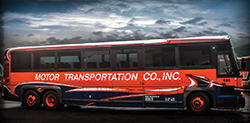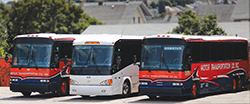
Flexibility and innovation keep the company moving forward
By David Hubbard
Launched in 1914 to run a mail route with two trucks and seven cars, and eventually transporting coal miners to their shifts in the nearby mines, Motor Transport, Hazleton, PA, celebrates 100 years of service with third-generation owners Lee Dotter and his sister Lori Yanuzzi leading the company.
As with many family-operated coach companies that had their start solving basic transportation problems for small communities, Motor Transport has grown from similar beginnings, steadily evolving its operations to stay abreast of transportation needs.
The Dotter family entered the bus business in 1927 when Leon Dotter purchased the company and transported passengers in an early 20th century Stanley Steamer.

His son Herman Dotter followed the business path, leading Motor Transport into motorcoach charters after running local transit and school buses.
According to Lee Dotter, Motor Transport established itself as a full-fledged charter and tour company during the 1964 World’s Fair in New York City, NY.
“The World’s Fair was a tremendous event, especially for this region,” Dotter says. “With the Fair, Motor Transport began to grow and by the early 1970s our tour business had expanded to the point where we opened a second garage.”
Presently, Motor Transport runs an exclusive MCI fleet of 13 motorcoaches, featuring four 102 C3 models and nine D-series coaches. Dotter says the company turned to MCI in 1980 when General Motors exited the coach business.
With that, the Dotters began selling off old equipment in 1984, including two GMC 4103s with stick shifts.
“My dad purchased three new 47-passenger MC-9s with automatic transmissions,” Dotter says. “What a difference. It was like going from riding on a donkey to a Lear jet. We never went back to manual transmissions.”
At 100 years and looking ahead, Yanuzzi says Motor Transport is planning a more robust and innovative charter tour agenda as the economy improves.
“Over the past several years in a weakened economy, our customers tended to choose single-day trips over the extended tours,” she says. “As the economy improves they seem to become more able and willing to go on multi-day trips, and a motorcoach is certainly the most economical way to travel.”
According to Yanuzzi, remaining successful in the tour and charter business requires innovation.
“One idea we have that is catching on is to customize motorcoach charter tours for fundraising purposes,” she says. “As we live in a community where groups and organizations are always trying to raise funds, and we’re always trying to increase our customer base, it makes sense to incorporate both our efforts.”
Yanuzzi says she began by asking various fundraising groups to share their collection goals. She then devised a series of reasonably priced one-day and overnight tours for group members that could generate that target amount for the particular cause.

“We operate these tours at a reasonable rate for customers who have a built-in reason sign up,” Yanuzzi says. “The passengers can sit back and enjoy the trip along with the camaraderie of the group. At the same time, they accomplish what they need to from a fundraising standpoint. We have gained new customers through these fundraising tours; people who would have never taken a motorcoach trip otherwise. They have been a big success.”
Dotter believes Motor Transport can roll for another 100 years simply by remaining flexible enough to evolve its services, routes and destinations.
“In the 1980s, when I started in the business, Atlantic City was growing and becoming more inviting,” he says. “But my dad warned us not to put all our eggs in one basket. That is always good advice.”
